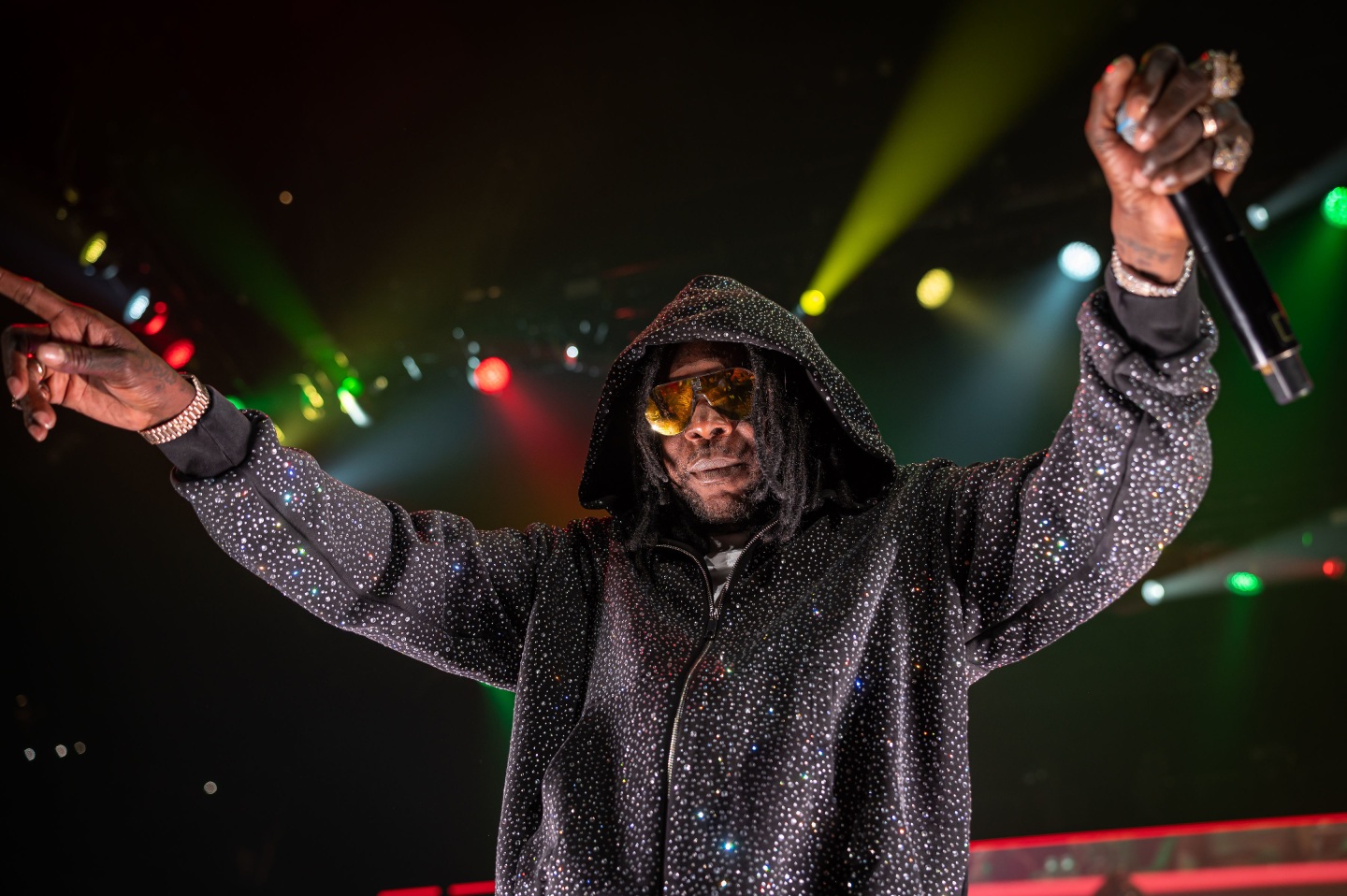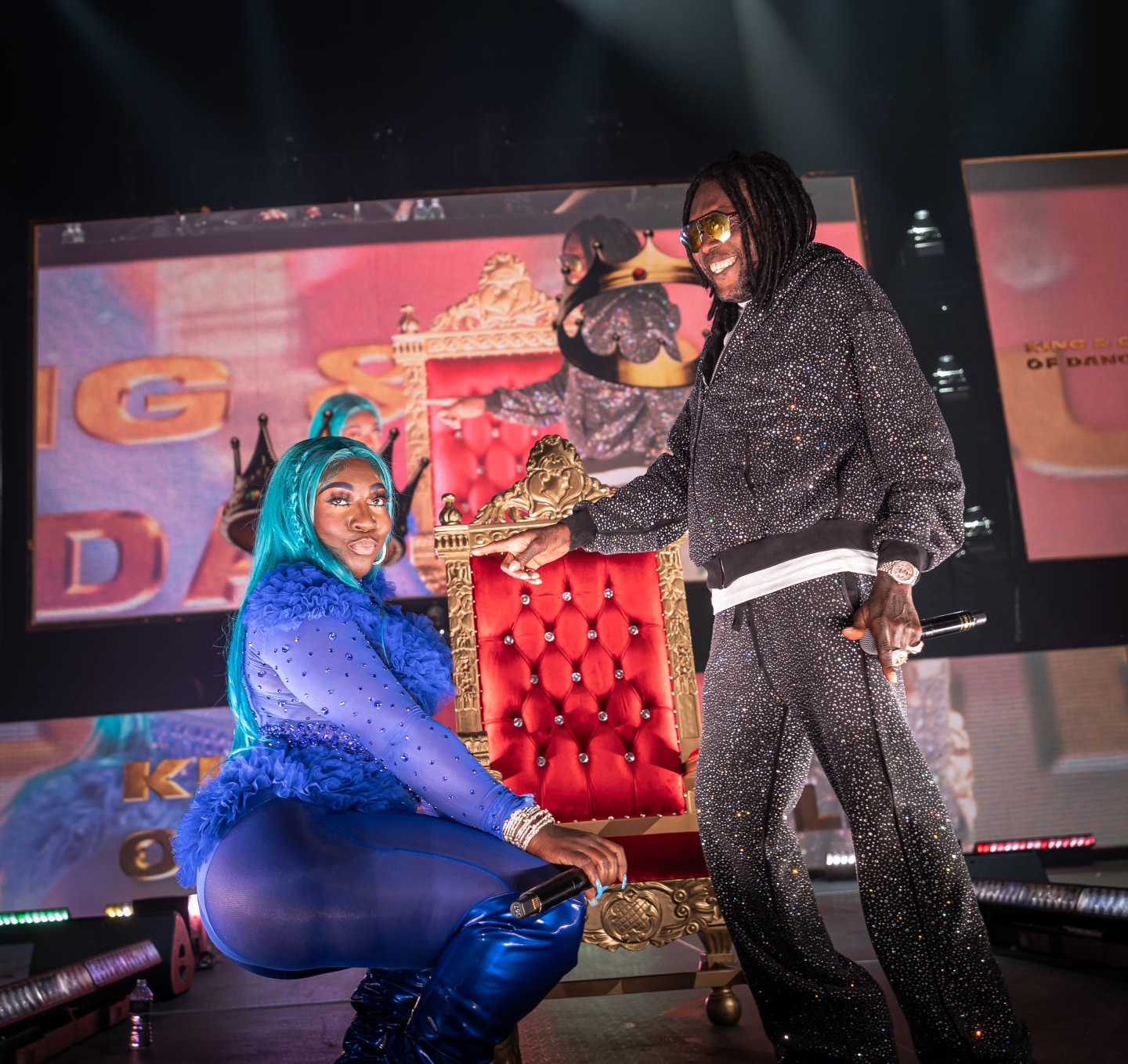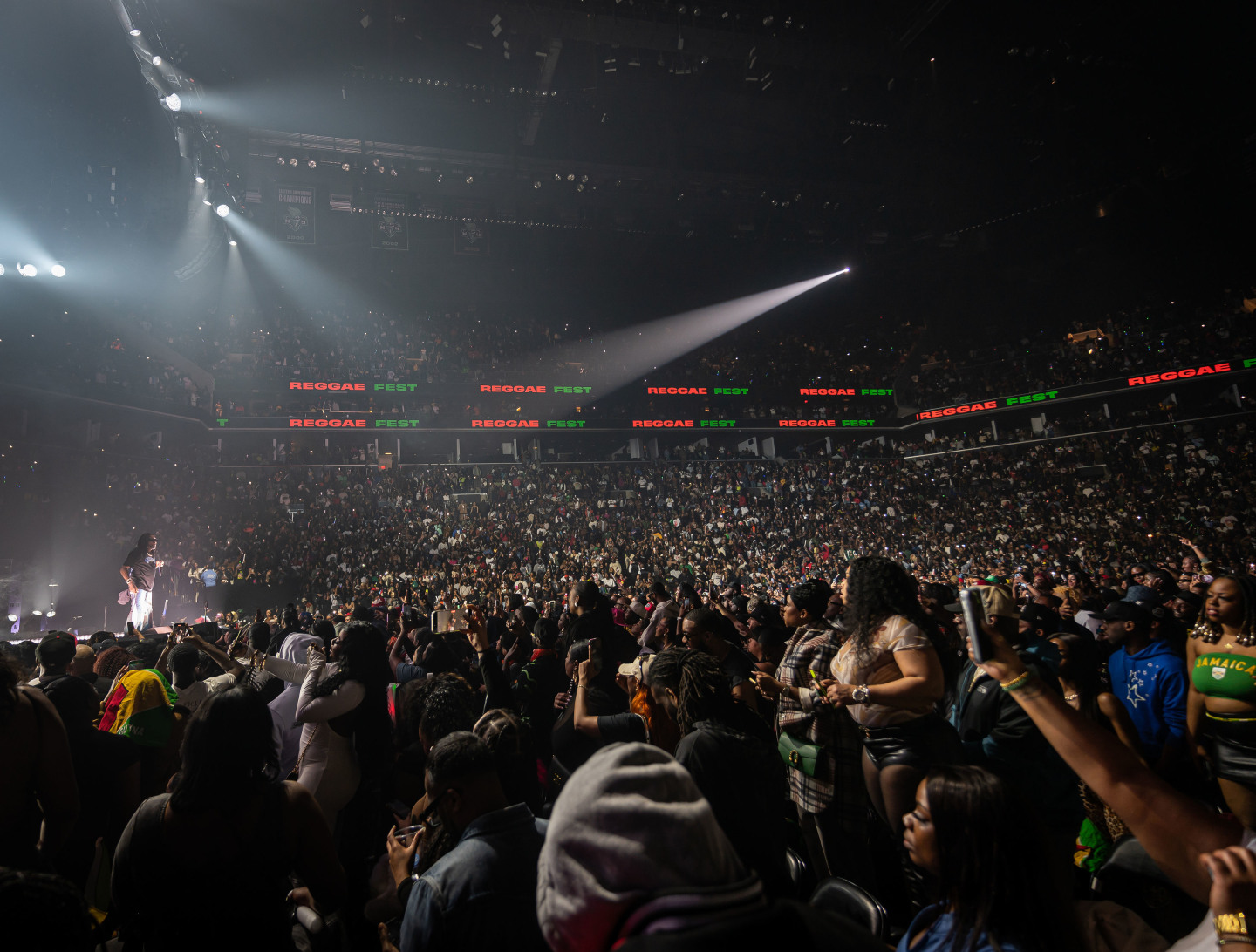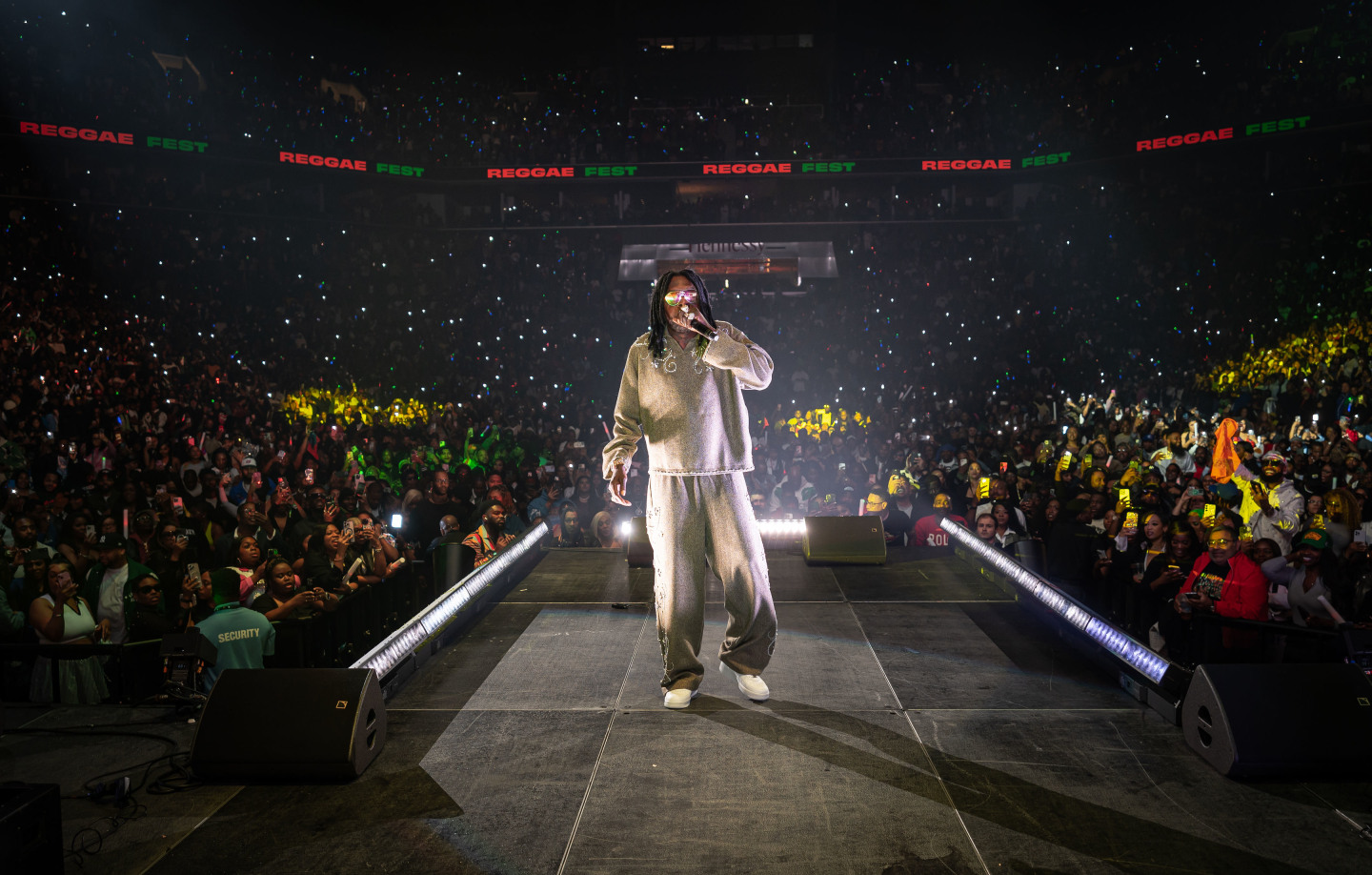Vybz Kartel. Photo by Tizzy Tokyo.
We’re a world away from one of the earliest shows Vybz Kartel played in Brooklyn. If you search hard enough, there’s footage of Kartel, slender and confident, performing on February 15, 2005, at a venue called The Rock. He’s dressed in a white suit, matching loafers, and a pastel pink undershirt that match his blinding, swaggering delivery. One of the most energetic showings of the night comes when he transitions into his remix of Akon’s 2004 hit “Locked Up.” Sweat pools across his face as he and the crowd go back and forth on the lyrics of a song that, years later, would feel like a prophecy of his spiralling legal issues.
But at this point, he’s only a handful of years removed from his beginnings, and still finding his footing. Kartel’s breakout riddims, songs like “Gun Clown” and “Most High,” translated the turmoil of his surroundings in Portmore, Jamaica into rudebwoy posturing and dancehall music that was sexually provocative, even by the genre’s standards. Jamaican law enforcement and government officials hated the songs, so of course, they became big hits locally and geared Kartel — now affectionately referred to as Worl’ Boss — to leave a mark globally with his formal debut album, 2003’s Up 2 Di Time. The album saw Kartel merge dancehall with hip-hop sensibilities, from fashion to flows and everything in between, and gave him the kind of crossover appeal that would mold him into becoming the King of Dancehall.
When I ask him if he remembers that Brooklyn show just over 20 years later, he answers me from a posh New York City hotel room, fueled by decades of music and acclaim. “No, that’s how long ago it was.” Still, he’s happy to be back in Brooklyn, a return that seemed improbable just a few short years ago.
In 2011, a marijuana arrest led to Jamaican police charging Kartel with the murder of businessman Barrington Burton. Though a jury eventually found him not guilty, he was later charged and successfully convicted of a different murder, that of Clive “Lizard” Williams, and received a life sentence in April 2014. But incarceration couldn’t keep Worl’ Boss from the world. Several albums—including 2016’s King of the Dancehall, which charted at #2 on the Billboard Reggae charts—and dozens of singles materialized from his prison term. Some were leftovers from before he went away, but most were recorded on an iPad in a makeshift studio in his cell made of pillows and mattresses.
For nearly a decade-and-a-half he worked prolifically in this setup, while his legal team appealed and his health worsened. In 2016 he contracted the thyroid condition known as Graves’ disease, resulting in weakened muscles, heart problems, and bulging eyes. Then, after dealing with all this for years, Kartel’s conviction was overturned in July of 2024 due to juror misconduct. He was released to an exultant nation of Jamaica and a vastly changed world. “Because I was going through my ordeal, I wasn’t even focused on happy memories,” he says. “We were just fighting to be out, and now we’re out.”

Vybz Kartel. Photo by Tizzy Tokyo.
He’s been on a non-stop victory lap tour ever since, playing shows, appearing at the Grammys, and buying his fiancé Sidem Öztürk an official engagement ring two years after proposing from prison. But he also laid his grandmother to rest this past January, and has more time to reflect on friends and family he lost while away. “You can’t stop pain,” he says bluntly, “But you can choose how you respond to it. That’s where my newfound appreciation for family and time come from.” But the loss hasn’t sapped his spirits or his sense of humor. His first day out of lock-up was simple: a limousine picked him up and took him straight to his mother’s house, where he had dinner with her, his father, and two sons. Then, he and Öztürk went back to his house in Ocho Rios and “had sex, several times,” he said with a chuckle.
A few nights from now, he’s scheduled to play his first two shows in America post-prison — back-to-back sold-out sets at the Barclays Center in Brooklyn, becoming the first dancehall artist in history to do so. Kartel’s ambitions haven’t changed a bit. “We aim to please, we aim to deliver, y’know? We’re talking high energy. Brooklyn, don’t wear no coat! We’re bringing the flames. It’s gonna be Miami,” he promises. These shows, presented by Reggae Fest, put Kartel in an interesting position: He has a boundless well of classics to pull from and dozens of newer songs he hasn’t performed anywhere. Nostalgia for Gen 1 Kartel fans is a given, but this is also a chance for a whole new generation, who grew up on the classics and the new stuff, to connect with him in-person for the first time. It exists somewhere between a nostalgia tour and a mapping out of a career second-wind.
When I arrive at the Barclays on the first of his two-night residency, it’s already chaos up and down Atlantic Avenue, fans from across the Black diaspora crowd around the arena’s entrances. Riddims blasted from cars and portable speakers swirl together into a ecstatic cacophony as excited friends link and strangers brush shoulders. The smell of hair products — castor oil, Jamaican Mango & Lime, setting sprays and freshly laid perms — is everywhere.
“You can’t stop pain,” he says bluntly, “But you can choose how you respond to it. That’s where my newfound appreciation for family and time come from.”
Inside, DJ Milan is already gearing the audience up with a smattering of dancehall hits old and new. I was only able to pick out Popcaan’s “Family” and the Bryson Messia, Lil Baby, and Rvssian collab “Choppa” before I was overwhelmed by the sheer amount of people packed into the nearly 18,000-seat venue, its sold-out crowd already beginning to spill out into the aisles. By the time Kartel walked out to his remix of Akon’s “Locked Up,” there was officially no telling where the seated area ended and where the aisle stairs began. “13 years inna prison, and mi come out a general!,” he boomed as he took his white fur coat off to thunderous applause.
He may be knocking on the door of 50 and still struggling with Graves’ disease, but Kartel’s energy was through the roof for much of the night. He was doing knee lifts like a marching band leader on Adderall, while running through hits like “Dumpa Truck” and “It Bend Like Banana.” Several songs were run back two or three times, and the crowd picked up any lyrics he stumbled through. Several guests popped out as Kartel took time to recover, some for a song or two, others for entire sections of the show. Busta Rhymes came out with some lightning-fast raps and longtime collaborator Rvssian did some hits to help welcome Worl’ Boss back. Jah Vinci and Black Ryno both appeared to do a handful of collabs with Kartel before spinning off into mini-sets of their own (Ryno was so geeked to be onstage, he tripped on his way down the catwalk).

Spice and Vybz Kartel. Photo by Tizzy Tokyo.
But the most involved and esteemed guest of the night had to be Spice, the self-professed Queen of Dancehall. Stagehands brought out two thrones, a red one for Kartel and a blue one for Spice, and whenever the duo wasn’t catching a whine to songs like “Romping Shop” or “Conjugal Visit,” they were basking in each other’s company, muses to the same dancehall god. “It’s giving children,” Kartel said with a smirk after one particularly intense duet — every shacked-up couple daggering within a 30-foot radius laughed out loud.
The two most heartfelt moments of the night came near the end. Clearly spent but excited to end the night with a bang, Kartel kicked off a rendition of recent song “God Is the Greatest.” He could barely get through it without bursting into tears as artists and team members came onstage to comfort him while the crowd cheered. In that moment, all the good fortune and pent-up emotion he’d accumulated since his release last July was unleashed, one of a handful of times the general let himself be vulnerable. The weight of the moment was as heavy as the drums: Dancehall has never been afforded a space this big in New York City before, so for a modern pioneer of the genre, returning to the public after years behind bars, to play one of the city’s most esteemed venues is a big deal, and not just for him. Regardless of what his future holds, that night was another blueprint from the Worl’ Boss, blazing a trail to the top that’s more attainable than before.

Vybz Kartel. Photo by Tizzy Tokyo.




